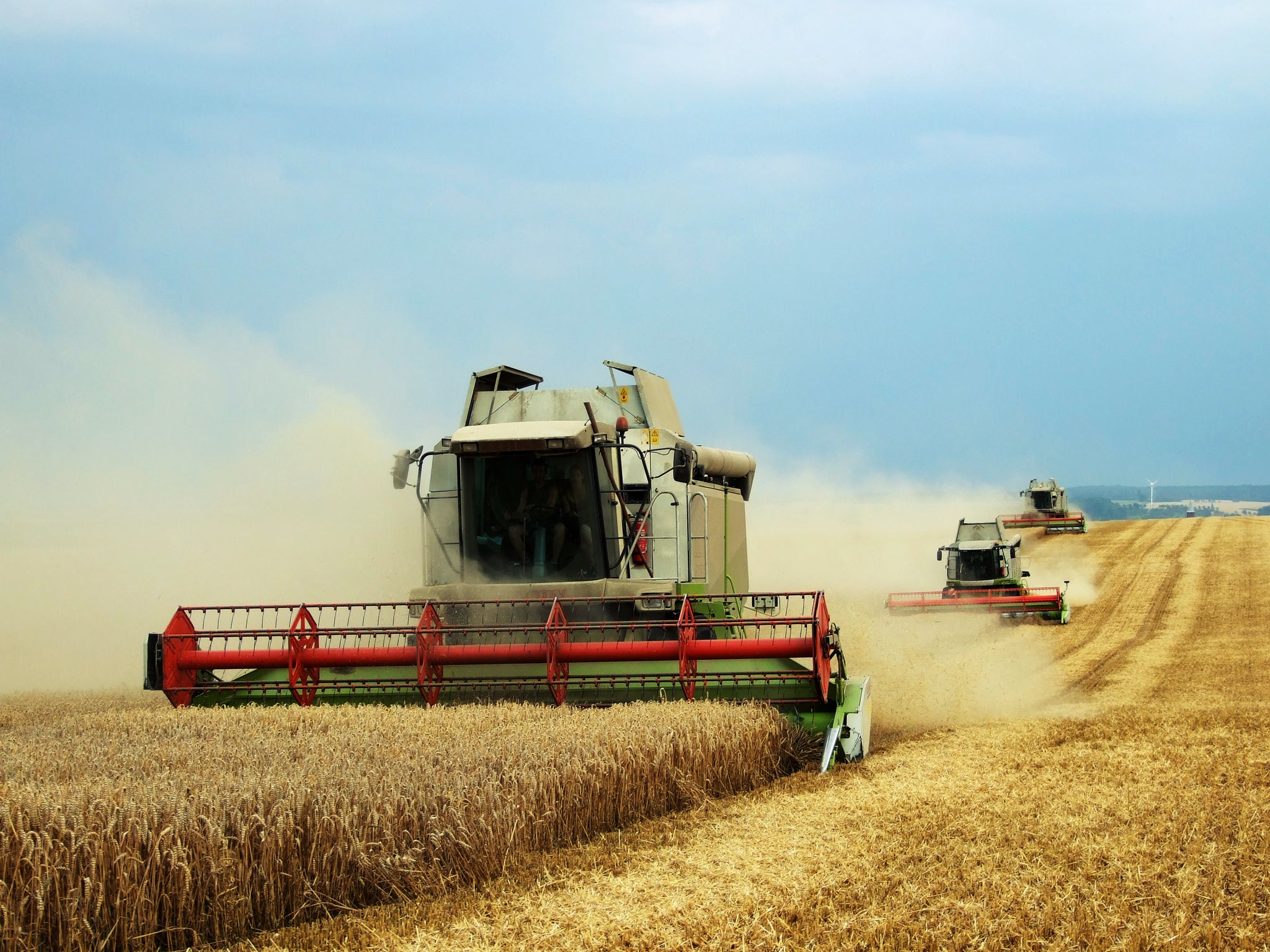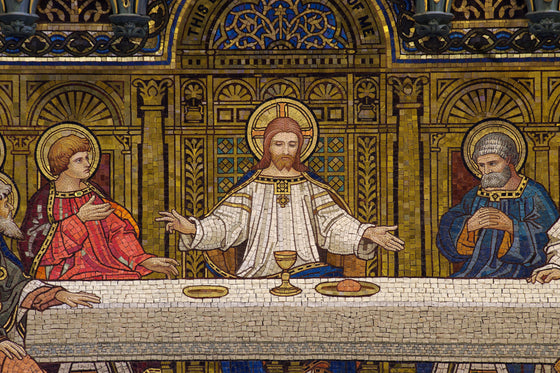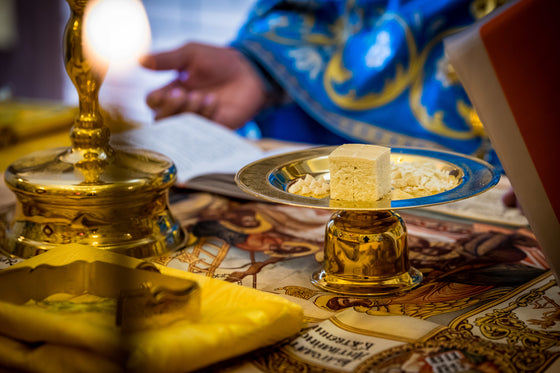Free Shipping on orders over $75 Dollars

As we discussed in Bread in the Bible, bread is a paradoxically good food that is mixed with sorrow.
“Bread is eaten because of sin. It cannot be produced apart from suffering — suffering depicted by sweat, toil, and thorns.” -Marcia Brim
Bread is good in that it is a tangible sign of God’s gracious love towards us. He did not forsake us after the Fall but provided us a means of nourishment that would both sustain us and teach us how to have a relationship with him.
Bread is a partnership between Man and God. God provides the elements (seed, soil, sun, and rain) that give us wheat, a tangible sign of his forgiveness. Wheat is then turned into bread through a laborious and toilsome process that is a tangible sign of our repentance offered to God.
We sinned but God is good. Our relationship with him can be restored. We can access God through repentance.
Bread is where God and Mankind meet.
In reading Genesis 3 through an “angry God” lens, we are tempted to see God pronounce his curses and storm off, later sending angels to kick Adam and Eve out of the garden.
But how were Adam and Eve to know what bread was? There was no such thing as a bread tree.
Someone must have taught them to pull out these seeds from grass, to grind them with rocks, to mix the dust with water, to bake it over a fire. Someone must have taught them how to make and use fire.
There is a tremendous technological leap required to go from eating food from trees to eating bread.
You need:
And knowing the good and merciful character of God, who is to say that God didn’t teach Adam and Eve how to make and wield such tools?
From an archeological standpoint, we have had tools that make harvesting easier for as far back as we can tell.

The sickle (above) dates as far back as 18,000 BC and is believed by scholars to have been a main ingredient in the domestication of wheat and the birth of agriculture.
The sickle led to the scythe and this is as far as we advanced up until the 18th century. Even with the efficiency and elegance of the scythe, harvesting wheat continued to be a very manual and laborious process.
Beginning in the 18th century however, humanity would enter a new era - one where humanity would loose itself from the toil of work for the production of food.
In the early 1700’s, several innovations led to an Agricultural Revolution in Great Britain.
All of these innovations, among many others, led to an explosive growth in the food supply and therefore the number of people in England and Wales. The population almost doubled in size from 1700 to 1801.
With more people (labor supply), good weather (the colder climate of the “little ice age” had ended), more wealth, and a higher appetite for risk, the conditions were ripe for the Industrial Revolution.
The Industrial Revolution in England spawned the mechanization of life as we know it. We created machines for everything. The agricultural industry was changed. The textile industry was changed. People moved away from farms and to the city. Communication and transportation became much more efficient.
The intellectual property that eventually leaked out of England and spread to the rest of the world was improved upon, launching what is known as the Second Industrial Revolution and which saw the rest of the world catch up to (Europe) and eventually surpass (the US) the output of England.
For the last 300 years the world has bowed before almighty Progress. Those who didn’t were crushed (Luddites) or pushed out and ignored (Amish).
Separated by time and space from God’s pronouncement to Adam and Eve in the garden, it’s easy to see how the narrative can be twisted - how God is blamed for our suffering.
We are tempted to think that if life is full of toil and toil is bad, then God can’t be trusted and we will therefore have to save ourselves from toil and suffering through our own ingenuity and the use of technology.
If given the chance to avoid the toil of food production and bread making, would we take it?
Yes we would. And we have.
We have now arrived at a point in history where humans no longer have to do any of the work to produce the food we eat.
In 1790, 90% of the US population worked on a farm. By 1990, less than 2% of the population was working on a farm!
Today, machines do most, if not all, of the work!
Ask anyone on the street whether the mechanization of food is good or bad and you will undoubtedly hear, “GOOD!”
But has it really been good for us??
The physical consequences of moving away from farm and into offices are plentiful. And this is just off the top of my head:
We used to get exercise (which our bodies need) through our work. It was fulfilling because we saw the fruit of our labor - and ate it!
Now, we do a full day of seemingly pointless work shifting numbers around on a screen and responding to emails. Then we pay money to do pointless physical work in a gym - think about it, we pick up weights, move them around, and put them back in the same place..
My point is that our bodies are not suited for the “ideal,” white-collar lives that we’ve created for ourselves.
Neither are our minds.
Workloads are heavier (more things to do) which means less time socializing. The workload is more constant which means more stress due to less downtime. Our work is more specialized which means cubicles and offices and loneliness.
Depression is now the leading cause of ill health and disability worldwide and modern work seems to be one of the main causes. According to Gallup, half of the American workforce is disengaged at work. Another 16% are flat out miserable at work.
Not only are there harmful consequences to our physical and mental health when we are removed from the production of our food, the most devastating effects are spiritual.
What happens to our souls when we don’t learn repentance? All of the problems in the world move from the sin inside me to to everyone else.
Acknowledging my own complicity in the suffering of the world produces a humility that invokes compassion. Without humility and compassion, the world becomes polarized - which is of course the world that we live in today.
Comments will be approved before showing up.

Bread was the means of reconciliation after the Fall. Through the production of Bread, God taught mankind to trust in him, repent of sin, and walk with him in gratitude.
Bread is a partnership between Man and God. God is responsible for providing the seed, the soil, the sun, and the rain. We provide the planting, the harvesting, the grinding, and the baking.
